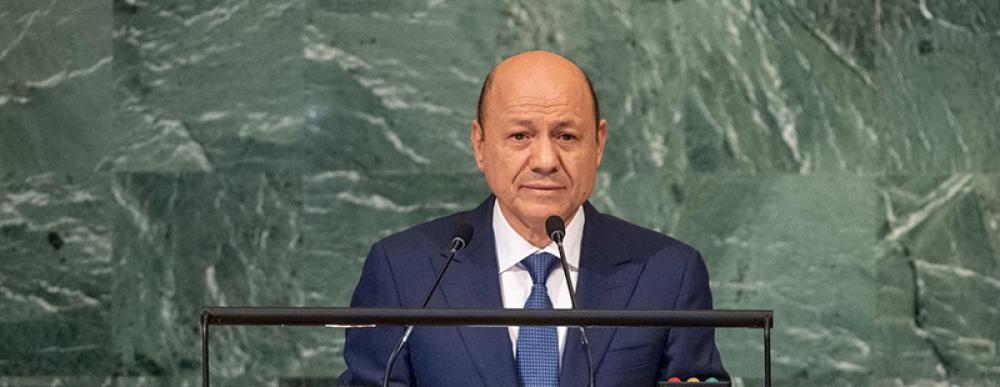Just Earth News | @justearthnews | 22 Sep 2022

Image:UN Photo/Cia Pak
New York: President Rashad Mohammed Al-Alimi said on Thursday that with the formation in early April of the Presidential Leadership Council as the legitimate representative of the Yemeni people, his country had entered a new era in based on partnership and national consensus.
“The highest goals of the Presidential Council will be [securing] peace and ending human suffering,” he told world leaders gathered for the high-level debate at the UN General Assembly.
As such, he continued, Yemen was now “on the path to restoring the State, ending the coup, restoring the system of rights and freedoms, equal citizenship, and ensuring that women and youth are empowered to create their own future and build the desired peace.”
President Al-Alimi affirmed the new Council’s adherence to the ideals of peace, in accordance with the terms of reference for a comprehensive solution to the Yemeni crisis set out in the Gulf Initiative and the relevant Security Council resolutions.
He also stated the Presidential Leadership Council’s commitment to establishing “an approach consistent with the Charter and functions of the United Nations, facilitating the work of its humanitarian agencies, political missions, and related oversight mechanisms, ensuring the political, economic and social rights of women, and preventing the exploitation of children and their recruitment into hostilities.”
Terrorist groups remain a danger
At the same time, Mr. Al-Alimi warned of the consequences of ongoing uncertainty in Yemen, saying that if progress on the political process slowed, “militias and terrorist groups are more dangerous in their cross-border threats, as well as their egregious violations of human rights.”
He accused the Ansar Allah group (Houthis) of “overturning” the national consensus emanating from the Comprehensive National Dialogue Conference, which ended in January 2014 with the participation of all Yemeni forces and parties, including the Houthis."/p>
Yet, he said, Houthi militias were impeding the presentation of the new draft constitution to a popular referendum, “and launched a massive invasion campaign to the capital Sana’a and the cities of Yemen and were threatening the President of the country and the Government of National Accord to Aden and … declared war on neighboring countries and the world at large.”
Devastating repercussions of war
The Chairman of the Presidential Leadership Council said that the devastating war in his country has today become a real threat to regional security and was impacting international shipping lanes and the entire global energy supply.
“It has claimed hundreds of thousands of lives and injured over the past years and thrown more than 20 million into the cycle of starvation,” he explained, noting that hundreds of thousands of people have been displaced, and more than four million internally displaced persons (IDPs) now faced “extremely harsh conditions.”
President Al-Alimi added that epidemics and floods related to climate changes annually brought costly death and destruction with the collapse of the Government’s protection and care network, “which limits our options to save lives, particularly in light of the intransigence of terrorist militias, their rejection of all endeavors to achieve sustainable peace, and to rebuild and develop our country.”
Renewing Truce
With the end of the humanitarian truce approaching, the Yemeni official reminded the Assembly of the Presidential Command Council’s commitment to all elements of the truce, “starting with conducting regular commercial flights to Sanaa airport and facilitating the entry of oil derivatives ships to the ports of Hodeidah.”
At the same time, he accused the “Houthi militias” of seeking a pretext to thwart the truce and impede international efforts to renew it and build on its progress towards achieving comprehensive peace.